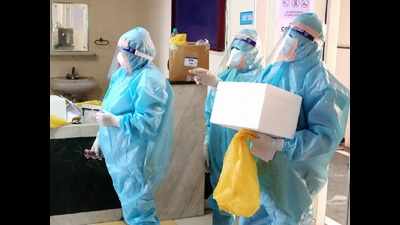- News
- City News
- chennai News
- Chennai: Covid-19 occupancy in private hospitals triples despite steep bills
Trending
This story is from June 5, 2020
Chennai: Covid-19 occupancy in private hospitals triples despite steep bills

Photo for representative purpose only
CHENNAI: Despite high costs, the number of people getting admitted at private hospitals in Chennai for Covid-19 has tripled in one week.
In the fourth week of May, 295 patients were being treated at eight private hospitals authorised by the government to handle Covid cases. On June 4, 907 were admitted at 20 hospitals. Ten other designated hospitals have zero cases on Wednesday and put together more than 3,500 Covid beds were still vacant.
However, not all patients get admission in private hospitals because of the high occupancy rate in ICUs. The unoccupied beds were in general wards.
For instance, doctors at MIOT Hospital in Nandambakkam said all 24 ICU beds were occupied on Wednesday and patients were moved between ICU, step down units and general wards depending on their health condition.
More than the beds, most hospitals were able to take limited patients depending on their staff capacity.
"Many people, who usually prefer private hospitals, got admitted at government hospitals initially fearing high cost. But the hygiene during their long stay there forced them to move to private hospitals," said Rex Sargunam, president,
Given that the treatment protocols like ventilator support in case of emergencies was no different, the government should allow private hospitals only to collect the same fee which is charged at pay wards in Tamil Nadu government hospitals, he added.
A K Ravikumar, state secretary of Indian Medical Association (IMA), said ICU care doesn’t mean ventilators alone. For instance, if a patient develops sudden breathlessness and dies, then their attenders might question why the person was not put in an ICU. Monitoring and support services for such patients can be provided only at ICUs.
"The major issue here is the cost and it should be a win-win situation for all. We have recommended the bare minimum cost without which we will not be able to run the hospital and provide a standard treatment," he said.
In the fourth week of May, 295 patients were being treated at eight private hospitals authorised by the government to handle Covid cases. On June 4, 907 were admitted at 20 hospitals. Ten other designated hospitals have zero cases on Wednesday and put together more than 3,500 Covid beds were still vacant.
However, not all patients get admission in private hospitals because of the high occupancy rate in ICUs. The unoccupied beds were in general wards.
For instance, doctors at MIOT Hospital in Nandambakkam said all 24 ICU beds were occupied on Wednesday and patients were moved between ICU, step down units and general wards depending on their health condition.
Riyas Segu, head of clinical operations and Covid management at Dr Mehta’s Hospital, said of the 187 patients treated so far, 6% were moderate to severe cases who required ICU care for 13 to 15 days.
More than the beds, most hospitals were able to take limited patients depending on their staff capacity.
"Many people, who usually prefer private hospitals, got admitted at government hospitals initially fearing high cost. But the hygiene during their long stay there forced them to move to private hospitals," said Rex Sargunam, president,
Tamil Nadu Health Development Association.
Given that the treatment protocols like ventilator support in case of emergencies was no different, the government should allow private hospitals only to collect the same fee which is charged at pay wards in Tamil Nadu government hospitals, he added.
A K Ravikumar, state secretary of Indian Medical Association (IMA), said ICU care doesn’t mean ventilators alone. For instance, if a patient develops sudden breathlessness and dies, then their attenders might question why the person was not put in an ICU. Monitoring and support services for such patients can be provided only at ICUs.
"The major issue here is the cost and it should be a win-win situation for all. We have recommended the bare minimum cost without which we will not be able to run the hospital and provide a standard treatment," he said.
End of Article
FOLLOW US ON SOCIAL MEDIA










